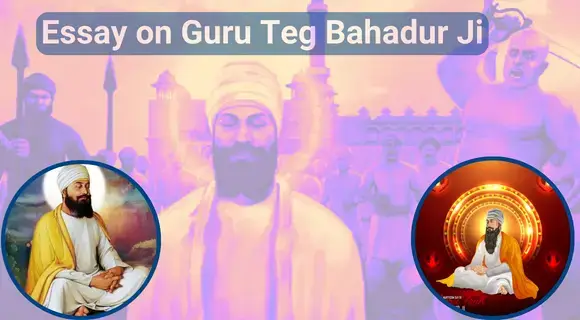Guru Teg Bahadur Ji was a very important person in the Sikh religion. He was the ninth Guru among ten, and people remember him for being very committed to religious freedom and for making great sacrifices for others. In this essay, we’ll learn about his life, his spiritual teachings, and why he’s remembered as a hero for religious tolerance.
Early Life and Education (1621-1664)
Guru Teg Bahadur Ji was born in Amritsar in 1621. His parents were Guru Hargobind Sahib, who was the sixth Guru of the Sikhs, and Mata Nanaki Ji. His birth name was Tyag Mal. He got a good education, studying under famous teachers. He learned languages like Hindi, Sanskrit, and Gurmukhi, and he studied religious books like the Vedas and the Upanishads. He was also skilled in martial arts and fought bravely in battles with his father. Because of his bravery, he was called “Tegh Bahadur,” which means “Mighty of the Sword.”
Spiritual Leadership (1664-1675)
When the sixth Guru passed away in 1664, Guru Teg Bahadur Ji became the leader of the Sikhs at the age of 43. He traveled a lot during his time as Guru, going to places like Punjab, Kashmir, Uttar Pradesh, and Bihar. He wanted to spread the Sikh religion and started new Sikh communities. He taught people about the importance of meditation, selfless service, and devotional singing.
Key Events During Guru Teg Bahadur Ji’s Leadership
| Event | Year | Significance |
| Establishment of Anandpur Sahib | 1665 | He started a new Sikh center promoting freedom and education. |
| Opposition to Forced Conversions | 1666 – 1675 | He protected Hindus who were forced to convert to Islam under the Mughal rule. |
| Martyrdom at Delhi | 1675 | He was arrested and killed by the Mughal emperor Aurangzeb for refusing to give up his religion. |
Champion of Religious Freedom
During Guru Teg Bahadur Ji’s time, the Mughal Empire was forcing people to convert to Islam. He saw Hindus suffering because of this and decided to help them. He traveled peacefully around the country and talked to people about why forced conversions were wrong. Many people respected him for this, but it made the Mughal emperor angry because he didn’t like anyone who opposed his rules.
Ultimate Sacrifice and Legacy
In 1675, Guru Teg Bahadur Ji was arrested in Agra for going against the emperor’s orders. He was taken to Delhi, where he was given a chance to escape punishment if he became a Muslim, but he refused. He was tortured, but he didn’t give up his beliefs. On November 11, 1675, he was killed.
Even though Guru Teg Bahadur Ji’s death was sad, people remember him for his bravery and for giving his life to protect the freedom of others. He became a symbol of courage and tolerance.
Conclusion
Guru Teg Bahadur Ji’s life teaches us important lessons about standing up for what’s right and respecting everyone’s beliefs. His message of peace and tolerance is still important today, reminding us to be kind to people of all religions and to fight against injustice.
